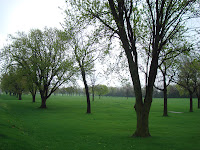An Earth Day Addendum
This evening as we prepare for the Fourth Sunday of Easter, the John 5:1-9 Gospel lesson that is an option for us in two weeks comes to mind. When Jesus notices the man lying by the pool of Beth-zatha, Jesus asks him “Do you want to be made well?” Two days after Earth Day, after a week in which many people have expressed the desire for a cleaner, more sustainable environment, I’m wondering what we really want. Do we want to be made well? (See the January 24 post about this passage.)
The Coast Guard discovered today that, contrary to earlier reports, the well that fed the oil rig that exploded and burned last week, collapsing into the Gulf of Mexico on Earth Day, is leaking oil. This evening’s story from the AP about the situation reports that the oil slick has grown to a twenty by twenty mile square.
This evening we have also learned that the Kerry-Graham-Lieberman climate bill that was supposed to be unveiled on Monday is now on hold. While many environmentalists considered the bill’s reported goals for carbon dioxide emissions to be too low to be very effective, the bill was a step in the right direction, and evidently the most robust bill that could be thought to have a chance to get passed in today’s partisan political climate. According to Matthew Daly’s article in the Huffington Post, Senator Kerry is talking about this as a short delay. However, the work on immigration reform will not be easy, and the political timing may mean that any climate bill has little chance of getting through the Senate.
Where do we put our trust? The man at the pool was empowered when he trusted Jesus and got up and walked. Trusting in Christ, we may be empowered to get up and galvanize the many grassroots efforts to change our own habits and to advocate for a sustainable environment. We would expect industry and political institutions to solve this problem, but God sometimes does the unexpected and surprises us with the people and circumstances God uses to do God’s work.
Industry and government could -- and probably should -- be leading the way in addressing climate change in a significant way that does justice to the almost incomprehensible importance of the issue. However, industry looks first at profit, and many holding political office today seem to look first at gaining and holding onto power. People of faith, following the Great Commandment of Jesus, have a primary allegiance to God and to loving our neighbors. We are in a position to put the integrity of God’s creation and the needs of our neighbors near and far ahead of profit and power; the voices consistently calling us to the work that needs to be done on behalf of the generations of humankind that follow us may need to come primarily from the church.



